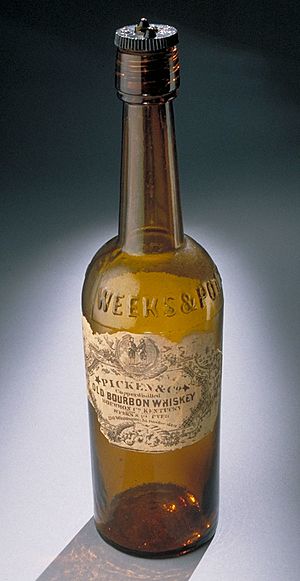Economy of Louisville, Kentucky facts for kids
The economy of Louisville, Kentucky, has always been strong because of its shipping and cargo businesses. Today, Louisville is home to many companies and groups from different industries.
Contents
Shipping and Moving Goods
Louisville's location near the Falls of the Ohio and its central spot in the United States made it perfect for shipping. Goods could easily travel from the city to the Mississippi River, the Gulf of Mexico, and beyond. The Louisville and Nashville Railroad also helped connect northern cities with the South.
Louisville is still very important for the shipping industry today. This is because of the Worldport air hub for UPS. The city is also at a key spot where three major Interstate highways meet: I-64, I-65, and I-71. This helps with moving goods by truck. The Port of Louisville also keeps river shipping active at Jefferson Riverport International. In 2003, Louisville was the seventh-largest inland port in the United States.
Making Products: Cars, Appliances, and Bourbon
Louisville is a big center for making things. Two large Ford factories are in the city: the Kentucky Truck Plant and the Louisville Assembly Plant. The main office and a big home appliance factory for GE Appliances (owned by Haier) are also here.
The city is a major hub for the American whiskey industry. About one-third of all bourbon comes from Louisville. Brown-Forman, a big maker of American whiskey, has its main office in Louisville. It also has a distillery in Shively, a nearby town. The main distillery for Heaven Hill, called the Bernheim distillery, is also in Louisville.
Other distilleries are in nearby Kentucky towns. These include Barton 1792 in Bardstown, Jim Beam in Clermont, Wild Turkey in Lawrenceburg, and Maker's Mark in Loretto. Like the Kentucky Bourbon Trail that links these places, Louisville has its own "Urban Bourbon Trail." On this trail, visitors can stop at nearly 20 local bars and restaurants. All of them offer many types of America's only native spirit.
Craft beer is also growing fast in Louisville. The city has over 14 local breweries, including Bluegrass Brewing Company and Falls City Brewing Company. In 2013, craft beer sales went up by 18%. To support this, Mayor Greg Fischer announced plans in 2015 for "Lou Brew." This will be a tour, like the Urban Bourbon Trail, to show off Louisville's local breweries and craft beer scene.
High-Tech Growth
Louisville is becoming known for high tech developments. In April 2017, Google Fiber said it would bring its super-fast internet network to the city. While that plan changed, AT&T Fiber has been building its similar service since October 2016. This service is also being built in nearby Indiana counties.
Beyond internet, Louisville helps people learn computer coding skills. This is done through a program called Code Louisville. This program was even recognized by President Barack Obama.
Local Businesses
Louisville is proud of its many small, local businesses and restaurants. Some of these are known for being very creative. In 1926, the Brown Hotel created the famous Hot Brown "sandwich." A few blocks away, the Seelbach Hotel is also famous for a secret back room. This room was used as a starting point for people who transported illegal goods from the hills of eastern Kentucky. Also, in 1880, John Colgan found a way to make chewing gum taste better for longer.
The Highlands area of Louisville, on Bardstown Road, has many local businesses. These include the Preston Arts Center, Baxter Avenue Theater, Carmichael's book store, and Heine Brothers' Coffee. Other popular spots are Wick's Pizza, Steilberg's String Instruments, and O'Shea's Irish Pub. Several local breweries are also in the area. These include Milewide Brewing, Gravely Brewing, Great Flood Brewery, and Cumberland Brews.
One Louisville business that has received a lot of attention is Omega Mirror Products. This company is the largest maker of mirror balls. When disco music was most popular, they made 90% of all mirror balls in the United States.
Other Important Industries
Louisville also has ties to the entertainment world. Several major movies have been filmed in or near Louisville. These include Goldfinger, The Insider, Stripes, and Secretariat.
A branch of the Federal Reserve Bank of St. Louis is also located in Louisville. This bank helps manage money for the region.
Past Businesses
For a long time, Louisville was home to the Belknap Hardware and Manufacturing Company. This company was once one of the largest makers and sellers of hardware in the United States.
Louisville was also home to Brown & Williamson. This company was a major player in the tobacco industry. It introduced popular brands like KOOL, Viceroy, and Raleigh. The film The Insider, released in 1999, was shot around the Louisville area.
Companies and Groups in Louisville
- 21c Museum Hotels
- ADP
- AssuredPartners NL
- Atria Management Company
- Block Starz Music
- Brown–Forman (Fortune 1000)
- CafePress
- Carewise Health
- Crosley Radio
- GE Appliances (subsidiary of Haier)
- Hillerich & Bradsby (maker of Louisville Slugger baseball bats until 2015)
- Hilliard Lyons
- Humana (Fortune 500)
- KFC
- Long John Silver's
- Norton Healthcare
- Papa John's
- PharMerica
- Presbyterian Church (USA)
- Republic Bank & Trust Company
- ScionHealth
- Texas Roadhouse (Fortune 1000)
- Thorntons
- Tumbleweed Tex Mex Grill & Margarita Bar
- UPS Airlines
- Yum! Brands (owners of KFC, Pizza Hut, and Taco Bell) (Fortune 1000)
- ZFX Inc.
 | Jewel Prestage |
 | Ella Baker |
 | Fannie Lou Hamer |


